Scrolling Past the Apocalypse
On Information Overload, Passive Evil, and the Cost of Seeing Clearly
Since Donald's return, opening your phone in the morning feels like bracing for a punch - you never know what headline will hit you. Tariffs on? Tariffs off? Beach resort in Gaza? Whilst this delighted some, it enraged and unsettled millions of people globally. Given the U.S.'s massive influence—both in setting the global agenda and in redefining what’s considered acceptable—it makes sense that even those not directly impacted feel disturbed. This feeling of being overwhelmed and outraged is further exacerbated by the fact that we are ultimately powerless in the face of it – the rest of the world doesn’t get to decide who the President of the United States is.
This is a crucial feature of the contemporary media environment – a flood of crises, negative news and tragedy. This leaves those of us who want to stay informed in a difficult bind: we crave understanding, yet feel powerless to act. In the constant barrage of negative news, many people sink into apathy and spleen (something I wrote about in a previous piece), and eventually, decide to just tune out and ignore the various crises tearing humanity apart (ten plagues for Egypt was a big thing back in Old Testament days, now it’s a chill Tuesday).
When that happens, we implicitly accept the third commandment from 1984 –ignorance is strength. While it might be a coping mechanism absolutely necessary in certain situations – after all, we can’t expect an emergency surgeon to feel the same sense of mortifying dread every single day -, other times it doesn’t seem to be a proportionate response. The real dilemma isn’t whether we should stay plugged into the endless flood of information—but how we choose what we care about. In a world where everything screams for attention, the moral challenge is no longer about avoiding ignorance entirely, but learning to distinguish between noise, distraction, and the information that demands a response.
We’ll have philosophy, we’ll have Greek drama, and naturally, AI generated images for a pop of colour.
Ignorance as Abdication – The Banality of Evil
This guy was a Swiss interpreter for the UN in the 50s, and he was famous for never missing a day of work in his 20-year-long career. He was also an enthusiastic stamp collector.
No, actually, this man is Adolf Eichmann, the Nazi operative responsible for organising the transportation of countless victims to concentration camps – a key perpetrator of the Holocaust. After the war, he escaped to Argentina, however, in 1960, agents of the Israeli secret services (Mossad) captured him and took him to Jerusalem, where he was tried and hanged in 1962.
Hannah Arendt—one of my all-time favorite philosophers and a certified badass—wrote about the trial of Adolf Eichmann in Eichmann in Jerusalem. What struck her most was his ordinariness. He was, as she put it, “neither perverted nor sadistic”; rather, “terrifyingly normal.” A bureaucrat, shrouding his actions in the cold language of logistics, primarily concerned with getting the job done. His inability to think from the standpoint of another, she argued, made his disassociation easy.
This is the essence of what Arendt termed “the banality of evil”: the idea that evil doesn’t always come from deliberate malice but from thoughtlessness—passive participation without self-reflection. It is important to underline that Eichmann’s thoughtlessness was facilitated, even encouraged in a bureaucratic environment that was designated to reduce people to numbers – and thus, foster ignorance to evil. He was a perfect embodiment of the logistical side of the Holocaust – the individual buffered from the morality of the actions by bureaucracy, while his actions actually result in horrors.
Or to put it differently, evil happens when one turns a blind eye out of convenience or self-interest. As a more classical thinker, St Augustine of Hippo put it,
“for what is that which we call evil but the absence of good?”
According to this school of thought, evil is not a force of its own but merely the absence or corruption of good. This makes it insidious, because it does not arrive in the form of obvious villainy. More often, it emerges from negligence, from the slow erosion of attention by the demand for constant attention, from a failure to think and reflect. Countless modern systems of the developed world are fertile soil for this kind of moral ignorance: logistics, tech, finance, algorithmic moderation, shopping malls, all put distance between the individual and the exteriorities of his actions. This ignorance isn’t a personal flaw—it’s a feature, not a bug.
Robert Musil who wrote one of the longest (and it was left unfinished!) books of the 20th century (The Man Without Qualities), a sprawling epic set in 1910s Vienna that is often compared to The Magic Mountain or Ulysses, tapped into something similar when he said:
‘Nowadays, truly ugly things do not happen because people do them, but because they allow them. They grow into the void.’
This sentiment carries a heavy dose of fin de siècle decadence and melancholy, however, it’s difficult not to emphasise with that today (what do young people say? It is what it is, right?). While social media has a strong impact on turning every event into a fight between the good guys and the bad guys (see my article on how this happened in the Gaza conflict), this doesn’t even get close to how morality functions and how people’s motives are intricately bound up with them wanting to ‘do good’.
With the amount of (negative) coverage flying about, it seems counterintuitive to talk about a ‘void’, however, I argue that a form of ‘void’ is the effective result of the constant noise. If everything has equal value as social media flattens out all the news, our capacity to focus and prioritise drastically diminishes and thus we pull back – creating the void into which the evil can grow. This withdrawal, our choice to disengage, is still a choice.
Byung-Chul Han argues that the digital transformation has changed the way we look at politics and engage with it. If we take politics to be the affairs of the polis (the community we are part of), staying informed about and taking part in politics is something that we should all aspire to do. However, with the digital boom, Han argues,
‘politics occurs “in passing,” as it were. The like button is the digital ballot. The Internet or the smartphone is the new polling station. And clicking a mouse or making a quick keystroke has replaced “discourse.”’
This marks a transformation of active engagement into passive consumption. We perpetuate action without actual action, politicians are chasing likes instead of voters, and citizens only observe instead of participating. This transformation of active citizens into passive consumers and spectators is a crucial feature of late-stage capitalism. People feel like they’re acting because the system rewards signals over substance. This isn’t just media—it’s capitalist governance. The information overload convinces us that we are well informed, however, seeing is not the same as acting, sharing a post is not the same as taking part in a protest. This information overload creates an abundance of information, but we have a void of truth and a void of knowledge.
The Risk of Knowing – Greek Philosophy & Tragedy
Unsurprisingly, the ancient Greeks had a lot to say about truth, ignorance and the moral aspect of the interaction of these things. Probably no story picks at this issue of whether it’s better to stay in the dark than to learn the truth than Oedipus Rex, a story about the OG motherfucker.
Long story short: the king of Thebes receives a prophecy that his newborn son will kill him and sleep with his mother. To avoid this rather unpleasant fate, the king puts the child (Oedipus) out in the forest, hoping it would end up as a wolf-snack . However, the baby is found and ends up being brought up by a neighbouring king and his wife. Later, Oedipus, quick-witted and proud of his brains, receives a prophecy, which is: you’ll kill your father and sleep with your mother. Hoping to avoid his fate, he runs away from home (from the parents he thinks are his own) and starts wandering. On his road, he runs into – his actual father! An altercation ensues and he ends up killing him (apparently road rage was not born with modernity). Then he goes unto towards Thebes when bam, a Sphynx stops him. The magical creature has been terrorising everyone going into Thebes – asking the travellers a riddle and if they don’t know it, eats them (or yeets them over a cliff, depending on the storyteller). Oedipus, a smart man, figures out the riddle, kills the Sphynx, saves Thebes – and as a result, ends up gaining the kingship and the widow of the late king: his own mother!
Then they have a few kids (Freud loved this story). A while later, a plague starts spreading in the city, a well-known sign of divine displeasure (what did we do to get Covid?). It turns out, it’s a punishment because the murderer of the previous king is still roaming free. Oedipus, proud of his brains and his identity tightly bound up with his skill as a puzzle-master, decides to investigate. Twists and turns, people warn him not to pursue the truth because it might be detrimental but he decides the truth is more important. When he finds out what he had (unwittingly) done, his wife/mother hangs herself, Oedipus pokes his eyes out and becomes a beggar. I fucking love this story!
Before I go into what is the moral of the story (besides you know, try not to kill your dad and sleep with your mum), let’s take a quick look at one of the most famous philosophical stories in history, which is coincidentally, also essentially the plot of the Matrix.
Plato is one of (if not the most) important philosophers of the Western canon. Not only that but his name literally means “broad-shouldered” for his prowess in wrestling so he could not only debate you to smithereens but could also put you in a chokehold if words failed him. His allegory of the cave is about the human condition, about reality and truth.
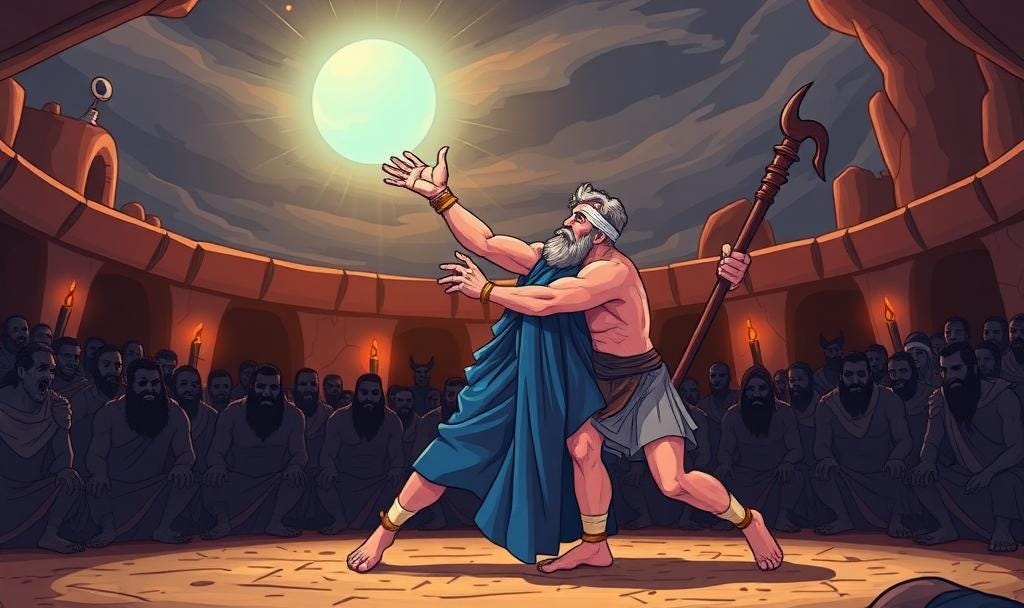
Imagine a row of people, chained together facing a wall in a cave, in a way that they can’t move. They have been brought up in this cave – they know no other world. Behind them is a fire, and between the fire and the prisoners, some guys are walking around carrying various objects - the prisoners can’t see these people, only the shadows cast on the wall. They think the shadows are reality because that’s all they’ve ever known.
One day, one unlucky soul gets dragged out of the cave. At first, he’s blinded by the sunlight—everything is overwhelming and confusing. But as his eyes adjust, he realises that the world is way bigger than he ever imagined. The shadows weren’t reality; they were just shadows of the puppets and the puppets are just copies of the real thing out there.
So the part that is not as often mentioned when this story is retold, is that when he goes back to the cave, the other prisoners find his yapping about the shadows not being real annoying, think that he’s insane and end up killing him. Oh, snap (a sad one). Do you start to see the pattern here?
The Greeks clearly had a very specific thing in mind when it comes to the relationship between truth and ignorance, as well as the possible outcomes that might mean for the person choosing not to be ignorant.
Let’s look at the main takeaways:
1) Ignorance is a choice and we should aspire for enlightenment.
2) Enlightenment requires effort and energy.
3) The truth is probably painful and might destroy us.
4) The truth is still worth pursuing.
We have seen that characters in both these stories can choose to turn their heads away. For those living in the cave, ignorance is thrust upon them at first but later, they can choose to venture into the outside world. For Oedipus, he could choose to ignore the plague but he wants to be a good king and he feels compelled to solve the mystery of the murder. Ignorance is a choice – and choosing to not be ignorant, to gather information, to act is also a possible route. The Greeks implore us to aspire for enlightenment. There is a nobility in striving and knowing – or to put it in a way that might sound more familiar: it is a brave choice to take the red pill (in its original sense, not in the pseudo-intellectual, right-wing manosphere sense).
The second takeaway is that finding out the truth is not easy. Oedipus follows the clues, interrogates witnesses, questions everything until he gets to the truth. Our protagonist from the cave climbs out from the depths, probably scratching himself on the rocks and getting some nasty bruises before getting to the surface. Neo gets into all kinds of shenanigans in his quest of finding out the truth about the Matrix – he even learns kung fu! Finding out the truth was never meant to be easy – or, as Byung Chul-Han said,
‘There is no such thing as a mass of truth. In contrast, masses of information abound. (…) Knowledge does not simply lie at the ready. One cannot just find it out there, as one can find information .’
We have to dig through masses of information to get to the truth and to get to knowledge and this is exhausting. It takes time, it takes energy and it is not easy. The world is complex, there are a million things going on – but we ought to strive for finding out what the case is. It’s crucial to note that I’m not advocating for hyper-awareness: but knowing what to know and how to stay informed so to be able to morally act is what matters.
The third lesson comes from the Greeks in a characteristically dark and sober note: if you look for the truth, it might be the end of you. Now there are two readings of this: one, the more literal one is that finding the truth might be physically dangerous – just ask investigative journalists. It can be painful: just ask anyone who ever found out about their partner’s infidelity. For Oedipus, the truth was so dark that he poked his eyes out. And finding out the truth can be, metaphorically, the death of you.
What do I mean by that? To be more precise, it can mean the death of a version of you. The version without the knowledge. The Neo before the red pill is not the Neo after the red pill. Oedipus is not the same man after learning the truth, and once you’ve been out of the cave, you can’t pretend that the shadows are all that reality is. Watching the Cowspiracy can make you a whole new person (a vegetarian), you can have a religious experience or decide to end a relationship – essentially killing that version of you. As Heraclitus, an entertainingly enigmatic Greek philosopher famously postulated, you cannot step into the same river twice – not only because of the river not being the same but also you are not the same. Truth and knowledge change you. They kill the older version of you and out of the ashes you emerge again.
This program of death and rebirth, however, shines as something worth pursuing. Oedipus remains a tragic hero because he did what was right even though the fates were against him. Our hero from the cave should be praised for trying to lift his peers out of their darkness. And Greek myths are populated by characters who decide to not pursue the truth and the festering wound of deception leads to a crueller and more undignified end for them. Furthermore, the cycle of death and rebirth is one of the oldest stories in the history of humankind – it is a myth that transcends time and space, continents and cultures. Its endless recurrence speaks to the human experience and its fundamental role in it – thus, I believe that it is something that we should all aspire to, even if in small ways.
As much as I like the Greeks, I must admit that the program they propose is radical and it might not be everyone’s cup of tea. Being destroyed over and over again by a barrage of terrible realisations is heavy fucking duty. That is the reason why so many people choose ignorance – sometimes it is just necessary if one wants to stay sane. And that is not, in itself, morally wrong. There are certain professions that face horrors where a certain level of disassociation is an absolute must. Others just simply don’t have the mental capacity to keep informed of all the negative shit going on day-to-day. Is there a way, however, that we can integrate a search for the truth and still remain sane? For that, I suggest we meet Peter Singer, an Australian philosopher who loves to surf.
A Way Forward – The Life You Can Save
Peter Singer’s drowning child thought experiment goes as follows:
You’re heading to work when you see a child drowning in a small pond. If you go and save her, your new shoes and suit will be ruined and you’ll be late for work. What do you do?
Most people respond that they would save the child. Singer then goes through different variations of the thought experiment and comes up with the following argument:
‘First premise: suffering and death from lack of food, shelter, and medical care are bad.
Second premise: if it is in your power to prevent something bad from happening, without sacrificing anything nearly as important, it is wrong not to do so.
Third premise: by donating to effective charities, you can prevent suffering and death from lack of food, shelter, and medical care, without sacrificing anything nearly as important.
Conclusion: therefore, if you do not donate to effective charities, you are doing something wrong.’
He then addresses all the reasons why people don’t donate to charity – and convincingly dismisses all of them. Reading his book, The Life You Can Save is a very humbling experience – you can actually download it from here for free, it’s a quick read and incredibly powerful.
At times, his book is harrowing and the moral weight of his arguments feel crushing. Why am I enjoying my laptop, should I just sell everything and become a monk, donating all my money to the poor?
Thankfully, Singer recognises that asking this much from people – even if the moral arguments for it are sound – would end up alienating most people and thus achieve nothing. Instead, he encourages small, direct actions – namely, his recommendation is giving to charity. And how much does he recommend as ‘moderately demanding’?
‘Roughly 5% of annual income for those who are financially comfortable, with less for those below that level, and significantly more for the very rich.’
Once you calculate your non-essential spendings – if you already live a comfortable life – this is actually very doable. But this only makes sense, if we all do our part – if we step up, collectively. Change – real, transformative change – can only arrive through collective action and public commitment; individual enlightenment and development is not enough. Also, let’s be honest – it can’t be expected that individuals shoulder the moral burden of helping the unfortunate, where the system fails them: the system also needs to change to not let these conditions exist in the first place! I propose that we try to keep these various thoughts in mind simultaneously – the crucial need for collective action but also our role in this ‘collective’ as individuals.
If you don’t like Singer’s altruism, because it’s too utilitarian for you, you can do other things too: volunteer, plant a tree, or simply sweep your street. But you can only do this, if you are informed. If you keep in mind the Greeks, knowing that finding out about the truth and how you can do your bit is going to eat up time, energy, and mental space. It might also change you – destroy you, in some respects. But if you open up the terrible window unto our world, that is the internet, with the mindset of setting out to seek the truth in order to do good – that encouraging thought might just be enough to help to stay sane.
Even in the face of overwhelming odds, small, direct actions can help. Not because they fix the world, but because they signal commitment to it. And while ignorance may be a temporary shield, it also becomes a habit—a narcotic comfort that numbs urgency.
Tuning out, humming along, pretending everything is fine—these things won’t fucking cut it. But the difficult, gritty work of looking reality in the face, and then still choosing to act, might. Not in grand gestures. Not in revolutions (not yet, comrade, not yet). But in small, slow drags of the moral dial—away from the lukewarm swamp of the status quo and toward something less shite.
Because we do have more than that in us.


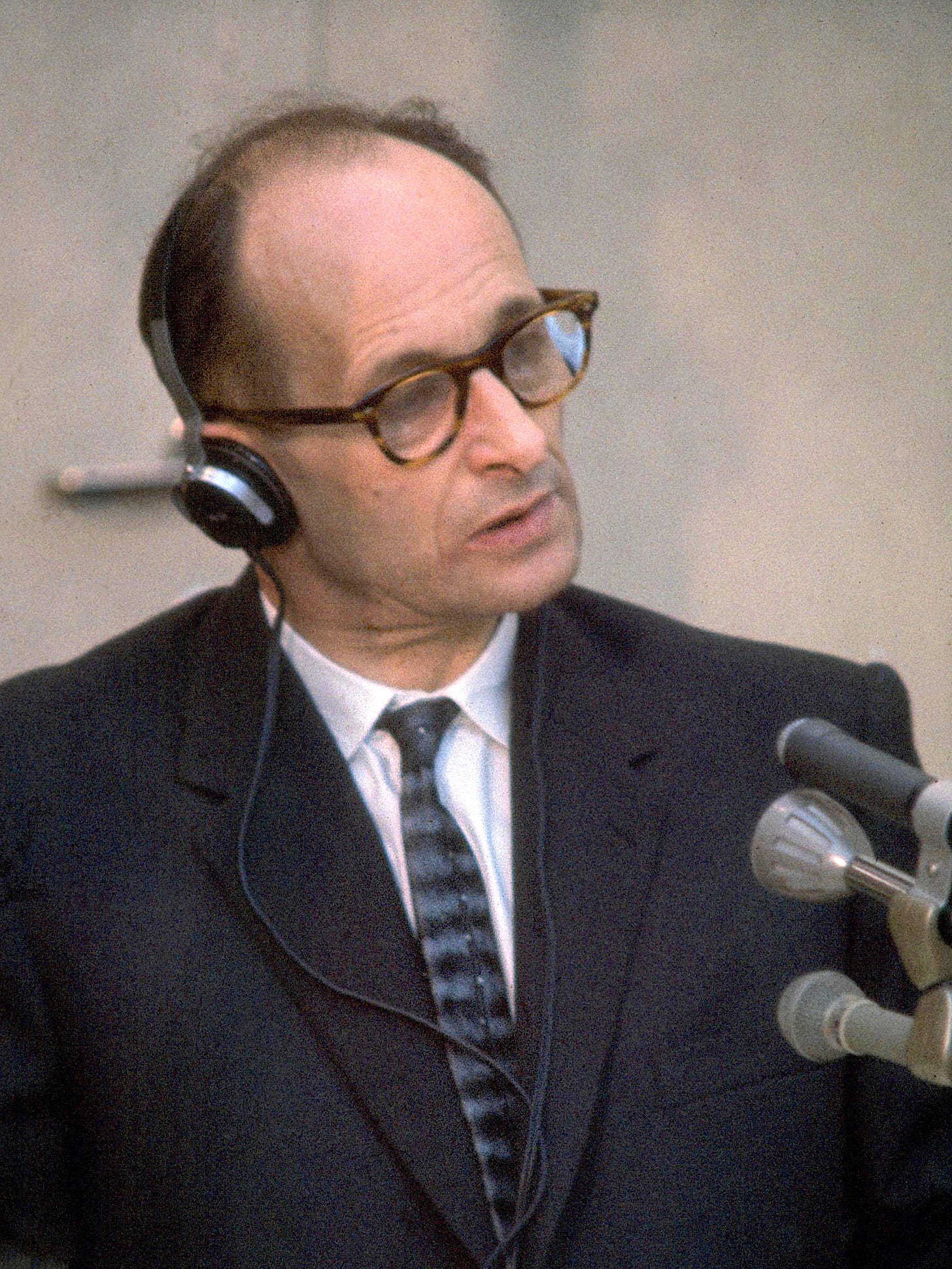
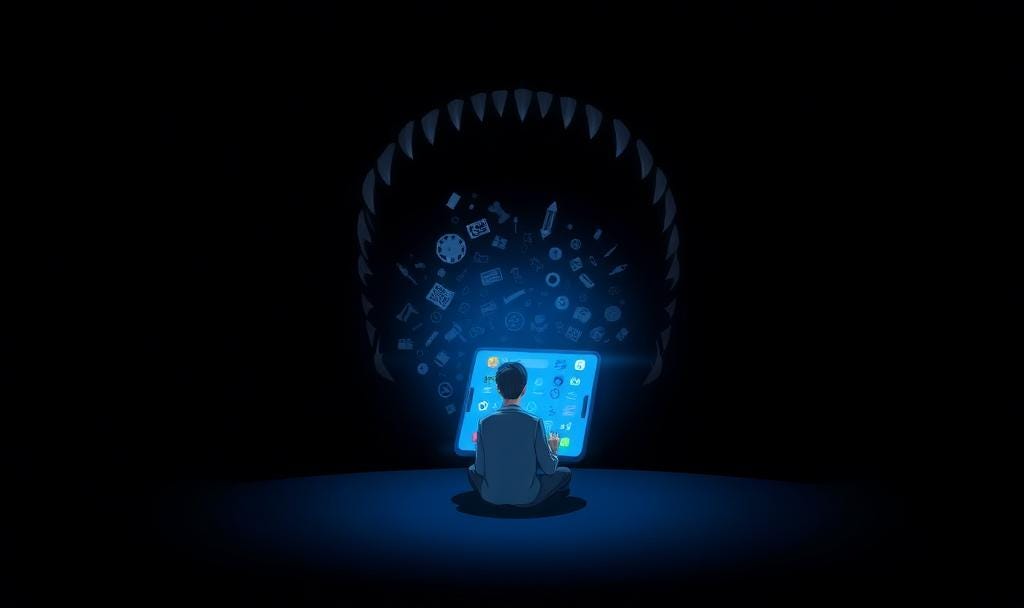
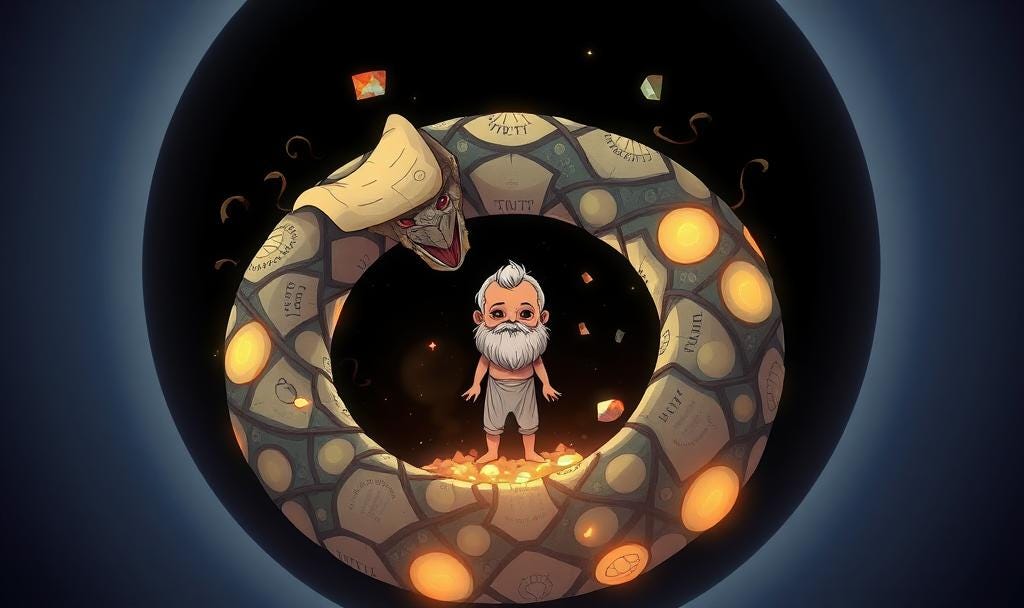
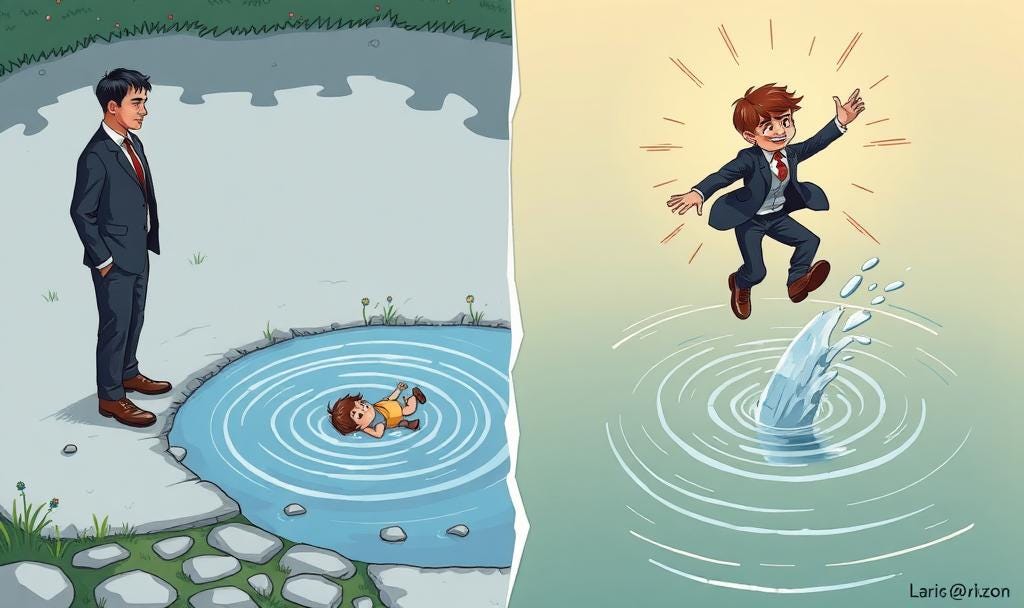
Good stuff! Imagine if the algorithms were crafted to enlighten and show us things that would help make our lives better instead of provoking engagement via emotional manipulation—like having real friends? I suspect we'd then all be more apt to act meaningful :)
In the world that rewards thoughtlessness, compliance, silence - isn't choosing to act revolutionary? Standing up, speaking your truth, disagreeing, taking space. All those things that first feel uncomfortable cause we're not raised to do them; going against what we're used to do simply because of "il faut," "stay normal," etc.?
One more thing that came to my mind earlier at the beginning of reading, is when you mentioned the "inability to think from the standpoint of another." I believe this is a really big issue, cause it's actually pretty hard to get out one one's head; we only know the world through our own experience. So to overcome this and try to imagine what may be going on for someone else (with as little of our own experience/needs/interests filter) is a huge job. And then we read all the online information and we "think" we now know what's in the head of another person. But do we really, or are we just in an echo chamber that gives us an illusion so it's even harder for us to get out?
Good read as always!